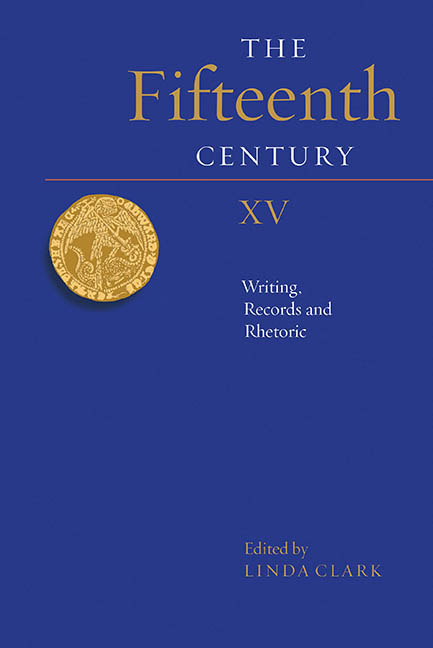Book contents
- Frontmatter
- Contents
- List of Illustrations
- Contributors
- Preface
- Abbreviations
- The Libelle of English Policy: The Matter of Ireland
- ‘Stories of Divers Regions and Provinces’: Some Digests of History and Geography for Late-Medieval English Readers
- ‘To please … Dame Cecely that in latyn hath litell intellect’: Books and the Duchess of York
- A Case Study in Lancastrian Service and Personal Survival: The Career of William, Lord Roos of Helmsley (c.1370–1414)
- Identity, Discourse and Political Strategy: Margrave Albrecht Achilles (1414–86) and the Rhetoric of Antagonism between Town and Nobility in Upper Germany
- The Redistribution of Forest Law and Administration in Fifteenth-Century England
- Well-Connected and Qualified Clerics? The Bishops of Dunkeld and Sodor in the Fifteenth Century
- Preaching Politics: Lancastrian Chancellors in Parliament
- Bishop John Alcock and the Roman Invasion of Parliament: Introducing Renaissance Civic Humanism to Tudor Parliamentary Proceedings
- Preaching on Magna Carta at the end of the fifteenth century: john alcock's sermon at paul's cross
- Index
- CONTENTS OF PREVIOUS VOLUMES
The Redistribution of Forest Law and Administration in Fifteenth-Century England
Published online by Cambridge University Press: 23 August 2019
- Frontmatter
- Contents
- List of Illustrations
- Contributors
- Preface
- Abbreviations
- The Libelle of English Policy: The Matter of Ireland
- ‘Stories of Divers Regions and Provinces’: Some Digests of History and Geography for Late-Medieval English Readers
- ‘To please … Dame Cecely that in latyn hath litell intellect’: Books and the Duchess of York
- A Case Study in Lancastrian Service and Personal Survival: The Career of William, Lord Roos of Helmsley (c.1370–1414)
- Identity, Discourse and Political Strategy: Margrave Albrecht Achilles (1414–86) and the Rhetoric of Antagonism between Town and Nobility in Upper Germany
- The Redistribution of Forest Law and Administration in Fifteenth-Century England
- Well-Connected and Qualified Clerics? The Bishops of Dunkeld and Sodor in the Fifteenth Century
- Preaching Politics: Lancastrian Chancellors in Parliament
- Bishop John Alcock and the Roman Invasion of Parliament: Introducing Renaissance Civic Humanism to Tudor Parliamentary Proceedings
- Preaching on Magna Carta at the end of the fifteenth century: john alcock's sermon at paul's cross
- Index
- CONTENTS OF PREVIOUS VOLUMES
Summary
On 1 May 1503, Thomas Savage, the archbishop of York, and Thomas Magnus, his secretary, held an inquisition into the state of the Forest of Pickering, in north Yorkshire. They were required to investigate a protracted dispute between two local gentlemen, Sir Richard Cholmeley, the master forester of Pickering, and Sir Roger Hastings, whose ancestors traditionally had held that office as far back as the thirteenth century. Hastings alleged that Cholmeley and his servants had ‘made, don, [and] suffered great wast in the seid Forests & parks, bothe [to the] wods & deere … which wilbe to the distruccion of the seid wods & game except remedy by yor wysedom be therfor provided’. Cholmeley denied that any such waste and destruction had taken place. The investigators Savage and Magnus initially found the matter difficult to decide, because they could not find reliable witnesses on either side: the officers in charge of the everyday administration of the Forest, whom they asked to testify, also happened to be Hastings's servants and were thus, as Magnus wrote in the inquisition return, ‘not … good lovers to the said Sir Richarde’. Unable to winnow out the truth from the obstructive locals, then, Savage and Magnus decided to take direct action. ‘Being perfitely enformed’ that the Forest had a circumference of about 60 miles, they took eight people ‘and went sodenly into the said foreste’. Within just two hours, their searches brought them between 140 and 160 red deer, and around 500 fallow deer, ‘and soe we avewed thaym at the same sodeyn assemble … and as to the distruccion of woddes we canne not fynde [it] in any wise’. Cholmeley was vindicated, and was subsequently entrusted with managing another royal hunting park in Yorkshire, at Raskelf.
Those relatively few historians who have studied the Forests in late-medieval England, like Sir Roger Hastings before them, have decried the waste and destruction of their governance and administration during this period. The first modern account of Forest law, by G.J. Turner for a Selden Society volume of the early twentieth century, stated that ‘after 1301 the whole forest administration was from various causes in a state of decay’. Since then, similar comments, invoking ‘weakness’, ‘decline’, ‘decay’, ‘chaos’, or ‘desuetude’, and even ‘effeteness’ have been made by almost every subsequent historian who has investigated the subject.
- Type
- Chapter
- Information
- The Fifteenth Century XV , pp. 93 - 108Publisher: Boydell & BrewerPrint publication year: 2017

